Every year around the June summer solstice, the south-west Chinese city of Yulin, located in the Guangxi province, holds the Yulin Lychee and Dog Meat Festival — commonly known as the Yulin Festival. It’s believed the event, which started formally in 2009, was created to draw a revenue-stream of tourists to counter the economic drought of the region. As many as 10,000 dogs havebeen consumed at a single fete, though numbers are said to be dropping down towards the lower thousands, hopefully due to shrinking popularity. For now, right now in fact, the festival rages on. For 10 days, attendees can choose cleaved or skinned, roasted dogs in their entirety—from nose to tail—all in the name of festival fun.
The story of what happens to these dogs is the stuff of slasher films, and with every stage of their torture, their captors and persecutors reveal their mercilessness and diminishing discord with humanity.
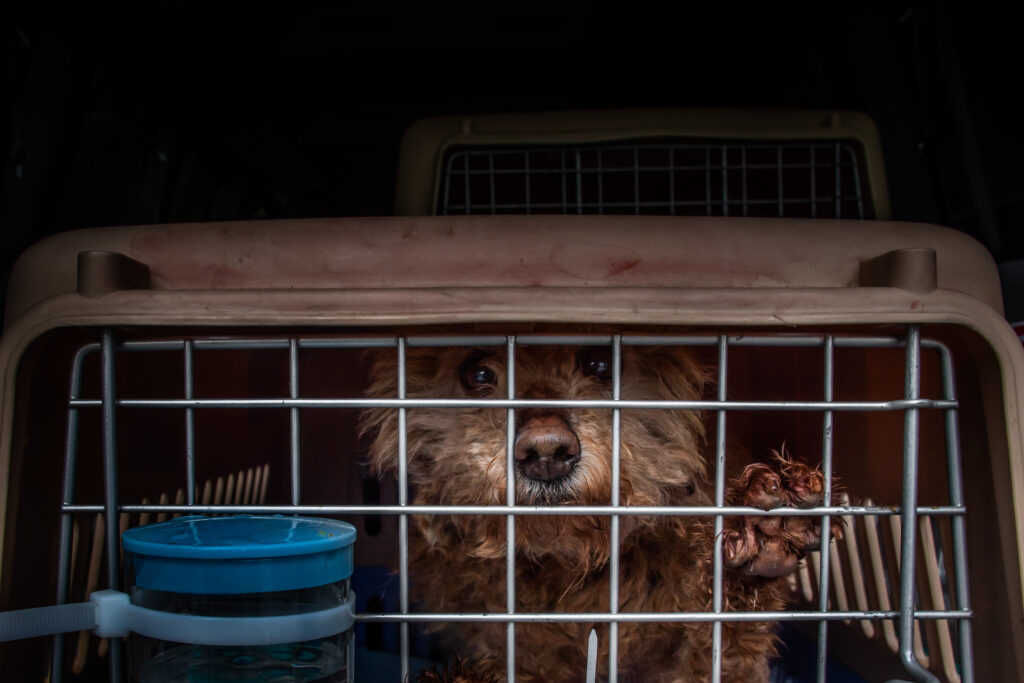
These dogs were not raised for their meat. In fact, some were house pets before they were unwilling sacrifices. They lived in loving homes. They had names and families. They were illegally captured, then driven hours away to an undisclosed location outside Yulin—making it impossible for owners to find them—and swiftly murdered in grotesque brutality. Aside from being stolen, they are then starved and some clubbed to death, or half-death, and often skinned alive. Even then some aren’t dead before they are boiled, butchered or roasted with a blowtorch.
Historically, dogs have consistently been called upon to save Yulin from economic destruction. According to Jeffrey Beri, founder of No Dogs Left Behind, a nonprofit devoted to saving dogs from the Chinese meat trade, there was a time when Yulin and its surrounding area’s lychee farms were under attack by rodents. They brought in dogs to curb the problem and the crops flourished. Now they had all these dogs without a job, so to speak, and rather than reward them with kindness or compassion, they decided to have a “festival” and eat them.
Dogs are cheap meat, unfortunately, and the bottom line here is money. There is no care or concern for the dogs, they are commerce. Beri explains that there is also a false belief that the torture is essential to releasing the dog’s endorphins which tenderizes the meat and, also false, that this sick process creates meat that heats up the body in the wintertime.
Finally, and most pitifully, there’s a myth that eating dog is an aphrodisiac.
This begs the question: Who are these fucking festival tourists?
And, further: If the essence of humanity lies in our empathy, without it, what are we?
The slow decrease in festival-goers over the years is primarily due to frontline activists who not only rescue the dogs, but fight for change, activists like Jeffrey Beri, whose goal is to end the dog meat trade and create stronger animal-welfare laws worldwide. “The Chinese fight the fight on the front lines,” Beri says, of the armies of on-site volunteers who lead the crusade. “We fight alongside them,a good fight.”
He adds: “I just won’t stop until change happens.”
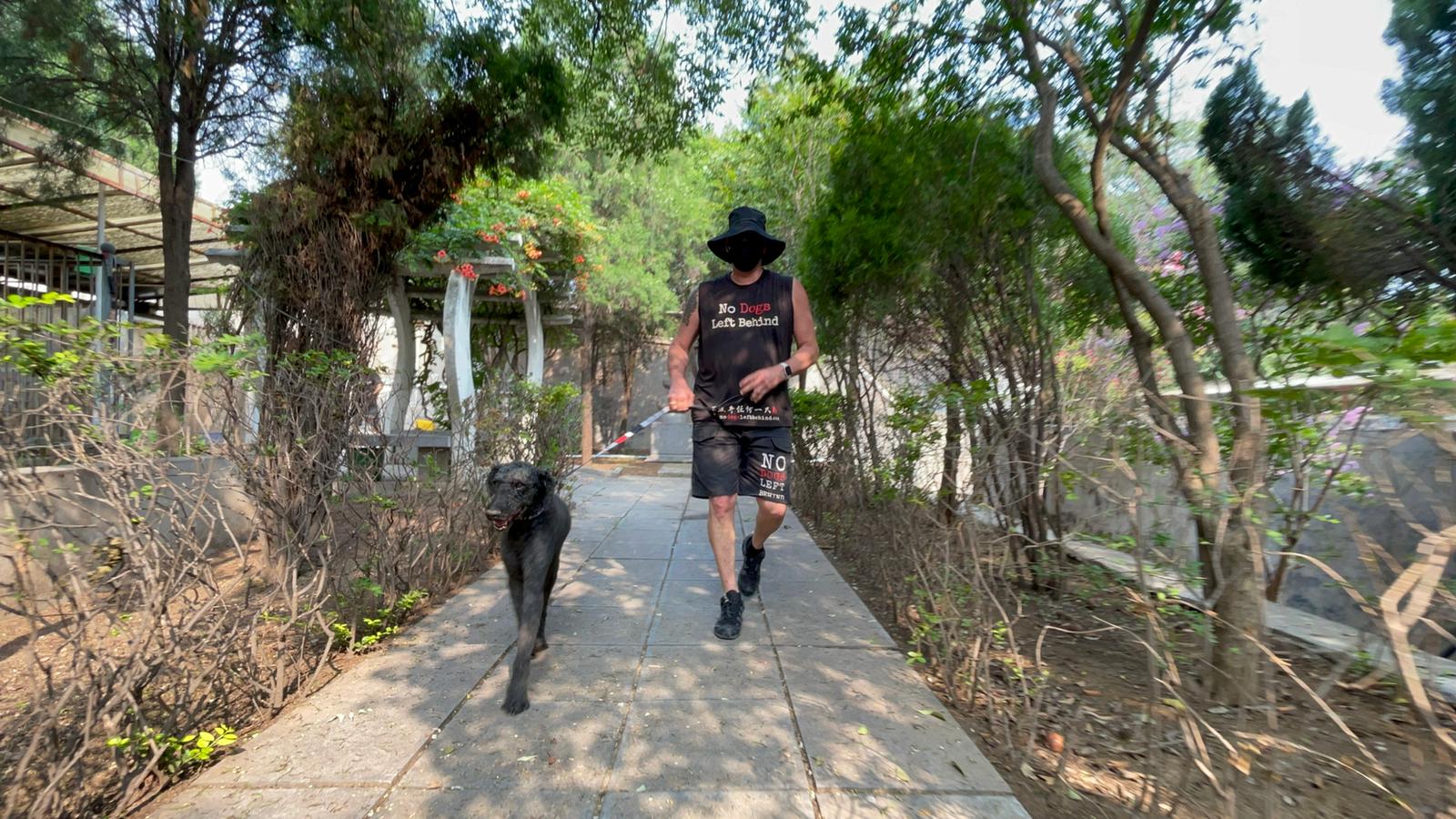
Jeffrey Beri modestly, unnecessarily, apologizes straight off that “It may get a little noisy in here,” his accent reflecting native New York City roots.
In spite of seeing his photo over the years, usually tenderly catering to a recent rescue, Beri isn’t at all what I’d expected. Pushing up his sleeve reveals a solid, sculpted forearm. His bold, squared features are softened by a thick salt-and-pepper beard, and though his eyes are shielded by dark wayfarers, it’s his deep empathy that’s most arresting.
Later, Jeff will introduce me virtually to his own dogs, all rescues, during their collective nap times, where they’d be resting peacefully on plush faux-fur beds. Jeff has three beautiful rescue Belgian Malinois: Yellow, Stam, and Prince, Jeff’s protector, a dog meat survivor from China. “The butchers were chasing him in Beijing when I was able to literally cut them off, get him in my car, and rush him off to the Beijing Sanctuary.” A terrified Prince bit Beri so deeply he needed stitches, but he reminds me that’s not a detail important to this story: “It’s inconsequential.” Jeff trained Yellow, Stam and Prince not to leave the cozy living area he’s set up for them, and by the looks of it, they’re thrilled with the arrangement.
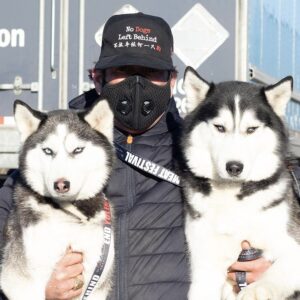
From where he sits in the NDLB safe house in Toronto—a high and wide warehouse structure—I spy a long row of dog crates behind him, all filled with lucky survivors Jeff and his team have recently rescued, including 16 golden retrievers that came in on a flight with NDLB “allies” Golden Bond Rescue, a volunteer-run nonprofit dedicated to finding loving homes for goldens, homeless under varied circumstances.Despite the chaos and their near-death, there’s a palpable calm, along with a few random “woofs” from time to time.
No Dogs Left Behind’s Instagram—tracking the epic, of-the-minute accounts of Jeff and his army of dog-rescuers heading into the perils of Asia’s dog butchery—shares stories of dogs pre and post rescue, dogs who went on to flourish in families filled with love, and dogs that don’t survive, despite all hope and effort. Depending on the day, it’s part crime drama, part psychological thriller and always a pull-at-your-heartstrings tearjerker. There are heroes, lots of heroes, everyday heroes risking their lives to save animals from extreme torture and eventual consumption.
And it’s one-hundred percent real.
One recent post, complete with warning label, shows a dog dead after being boiled alive, its blood curdling scream frozen on its face, the excruciating pain palpable. This dog will be offered up in the name of revelry, for someone’s eventual meal. One particular Yulin celebrant will select this animal and decide this—this heart-wrenching display of agonizing torment—is today’s lunch.
There is no resignation on this dog’s face, only a last grasp for life.
In 2016, Beri was a successful jewelry designer looking for a deeper purpose. That year he founded NDLB after rescuing 121 dogs from the Yulin slaughterhouse,spending the following eight months creating the protocols for the organization, including medical treatment, re-homing, socializing — so much goes into giving these survivor’s a fighting chance. Then, he went back in and rescued 50 more. When asked how many dogs he’s rescued to date, he says, without hesitation: “Hundreds of thousands.”
The ultimate mission of ending the dog meat trade has everything and nothing to do with dogs. For Beri, as well as his army of thousands of worldwide volunteers, it’s dogs they have chosen to illuminate the critical and ever-present “global war against animal cruelty.” NDLB is a “boots on ground” organization. Definition: They go in and get shit done. They don’t sit outside and talk about doing it, they do it. Their mission is to save as many dogs as possible. And every single time, they are putting themselves in extreme and undetermined danger.
“The butchers hate me, the traffickers hate me and many of these countries that don’t enforce animal welfare laws hate me. I’ve been detained, who knows how many times,” he says, shortly after we’ve exchanged hellos. He explains that being “detained” is a completely expected part of what he does. He’s been followed by the Secret Service in China, “sometimes 25 of them at a time.” They’re everywhere Jeff is: following him on foot, on bikes, blocking his car. So why haven’t they caught him yet? “If I do get arrested, we have 10,000 large in an underground army. I could dispatch hundreds of people to a geographic location to fight in the front lines.”
“Are you scared?” I ask.
“Nothing scares me,” he says.
At the end of January, after three months of planning and his entire board of directors voting against it, Beri went on a solo dog-rescue mission to Afghanistan and found himself with AK47s stabbing into his chest.
“Do you remember the story of the dogs left behind? Remember when the Americans pulled out? I went back to get them. I did that with a coalition of people…working on it for months. My role was: fly there, assess the dogs, pack dogs, load the dogs and fly the dogs back, which was extremely complex in nature because a lot of these dogs were wanted by the Taliban.” The dogs are assessed for health and temperament to decide if they can survive the extended travel and finally be re-homed.
[embedded content][embedded content]
“We have 300 animals we transported back on a Russian cargo plane. I’d basically packed them, loaded them. I went there, assessed them,for 13 days working with the teams there — what dogs can’t come, what dogs shouldn’t come. Assessing the stability, the health of the dog because if they land and they’re not healthy or if they land and they go to the wrong place, then what is their fate?” According to Beri, he does a visual check: not coughing, they can stand, they’re playful, of age to transport. Whether they are harsh or scared is “inconsequential,” he says, as working with the dogs post-landing is part of his protocol.
Jeff was there as a volunteer for Kabul Small Animal Rescue (KSAR) working closely with its founder Charlotte Maxwell-Jones, who was living in Afghanistan taking care of the dogs. “When I got my visa, the Taliban said straight out, ‘You have to sign this paper that your life is at risk. The American government has no jurisdiction over your life anymore. Once you land in Afghanistan, you are under the supervision of the Taliban.’ These are the number one terrorists of the world that I was literally working with as an American,” he says, adding, “It was an incredible experience.”
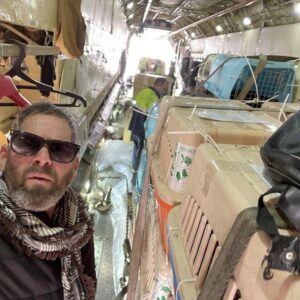
Within a few months, Jeff and his team found homes for most of the dogs, asking the new owners not to publicize the adoptions for fear the Taliban will show up at their door wanting the dogs back.
“There were a couple of really fearful, really crazy times,” Jeff says. “One time getting out of the car, a Taliban soldier jumped out of his armored vehicle and comes running over to me– no, he was outside the vehicle, standing there. He saw me, ran back to his vehicle, grabbed his AK47, loaded it, cocked it, pointed the gun at the window, ‘Get out of the car, get out of the car! What are you doing here? Passport, passport!’ He takes my passport. Fifteen Taliban trucks pull up with machine guns, they thought I was a journalist that they were looking for.
“That could have ended my life right there. They run, shoot and then aim. That’s how they work. They’re all kids and they’re thugs, they’re basically thugs. They’re criminals.
There’s another time where I was going through a checkpoint and I was with the secondary driver and the Taliban stopped us screaming, “Get out of the car.” The guy pissed himself. He pissed himself and after I found out his family was killed by the Taliban.
“That was one of the most dangerous missions I’ve ever completed in my life.”
Later, post-interview, when questioned about what to leave out of this article in the name of Jeff’s personal safety, he tells me, shockingly, to do what I think is best: “Let’s get some excitement out there,” he says.
“You don’t have enough excitement, seriously?” I counter.
“I was born to die, believe it or not.” When I tell him that we all were, he tells me, “I am not afraid of tomorrow, and I am not afraid to die.”
According to ancient myth, when Zeus, the king of all gods and humans was born, his mother, Rhea, sent a protector to keep her son and his nurse, a goat, safe. There are many versions of what happens next, and in one, the Kuon Khryseos, more commonly known as theGolden Dog, loyal and determined, stayed steadfast by the young king’s side until it became too old for its charge, at which stage Zeus appointed his beloved companion an easier, semi-retired position in Crete, guarding his temple. In one retelling, Zeus’s dear dog was stolen by the mortal Pandareus. Zeus went into a crazed uproar, summoning all the gods to help capture the cretin, finding him, and eventually dropping a mountain on him as punishment. In another version, it’s Tantalus who initiated the thievery, and upon capture was cast down to Hades, where he, forever thirsty, stood in a pool of water up to his chin which would shrink beyond reach if he tried to drink it. In yet another version, when both Zeus and his dog had grown older together, he placed his cherished canine in the stars, thereby becoming the constellation Canis Major, who, in yet more versions, is also sometimes attributed to Orion, the eternal hunter, with Canis Major claiming the brightest star in the sky, the “Dog Star” Sirius, and, no matter how you tell it, forever beaming, watchful and loyal to his master.
The etymology of the word dogged, in the positive, literally defines the loyalty and determination, the steadfast companionship, the always-see-the-best-in-you adoration that makes dogs such beloved creatures to many of us mere mortals.
In Yulin, the dogs are acquired in various all-horrific ways. Many are stolen from the backyards of loving homes and transported hours away to a remote location. “Traffickers are grabbing dogs from anywhere they can,” Beri says, noting that no dog is off limits, including street dogs, exploitative breeders with a puppy surplus, and those who are slightly disabled.
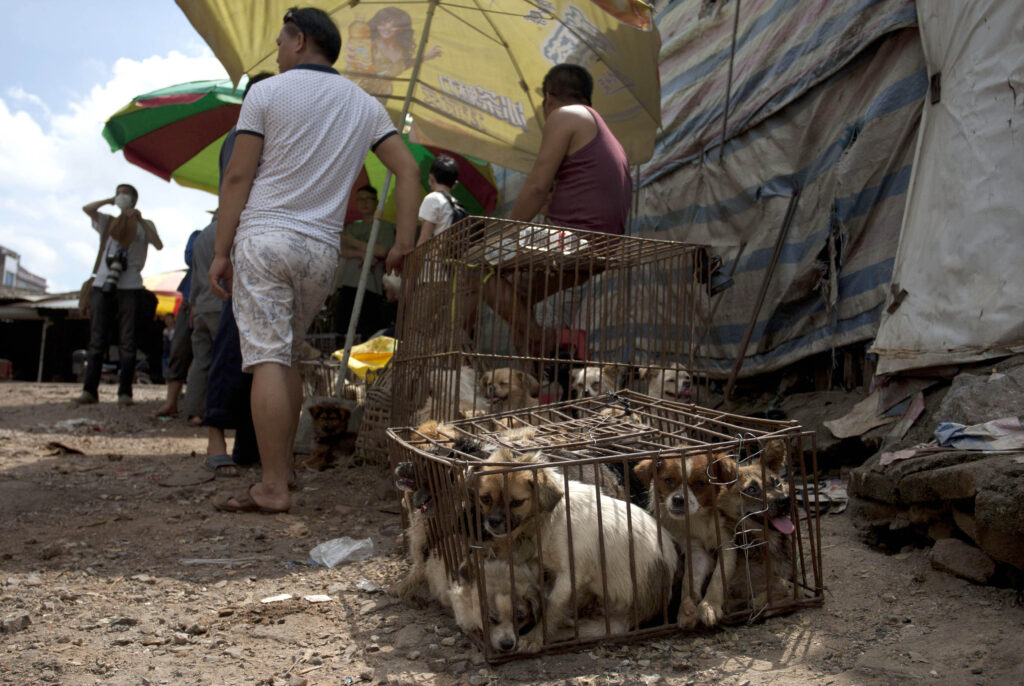
Full disclosure: I am biased. To me, it’s impossible to comprehend how someone could devalue a pet to such an extent that they would submit them to torture and consumption—and not just dogs, any animal you’ve formed a deep, loving bond with. When I adopted my own dog, now going on 13, I vowed to see it through to the ending that was most compassionate and best for him, something I’ve put into practice throughout his life riddled with health issues, and now with some much more serious. Understanding the financial constraints many endure with sick dogs, they make decisions that align with their means, and that feels, unfortunately, understandable. For the rest of us who honor our dogs until their passing, we all only hope that they will live in the stars, forever watching over us, a solace that gets us through the loss of “dogged” unconditional love, which sciencedoesn’t need to keep “proving” is as profound, if not more so, than losing a human loved one. Anyone who’s ever loved a dog can attest, a dog’s death forever takes a piece of your heart.
That’s why, when Jeff informed me that many of the dogs were sold by their owners for a small sum to the butchers because of their age or sudden inconvenience, regardless of the torture that would await them, I realized that this defines the root of problem.
As Temple Grandin famously states in her book of the same name: “Animals make us human.”
Further, animals — and our treatment of animals, our mindset around animals — define the true depth of, or lack thereof, our own humanity.
To be clear, this isn’t an indictment of Chinese people, the vast majority of whom have never eaten a dog and don’t support the dog meat trade. The world, in fact, is very full of people who would never eat a dog, never sell their dog to a butcher, never abandon an old dog, and never, ever willingly submit their dog to torture.
“It would be foolish to think that about China, because there’s amazing people in China and the tides are turning,” Beri says. “More people are taking dogs and considering them family pets and treating them just like their children. I believe that it’s a dying breed of people that continue to eat, consume dogs. We’re doing everything in our power to educate the young so that the future holds a chance.”
Some might say to themselves: Why shouldn’t they eat dogs? If we eat cows/chickens/pigs/lambs—then why not dogs? Let’s say you don’t value dogs as companion animals. Or perhaps you’re someone who views one life (a dog’s) as infinitely valuable as any other. If this is true, by definition you value life and, perhaps on some level, value the connection between one living being to another.
Therefore, as someone who values life, you’d have to agree that the way many of the dogs are acquired is criminal at best, and their manner of execution inhumane.
“When the dogs are picked up they are picked up with metal poles. They’re metal rods. Oftentimes their jaws are broken, oftentimes they grab them and then they get slammed into chicken cages. That’s when the torture starts,” Beri says. “The dogs are loaded into chicken cages where there are extremely sharp barbed wires that are shredding through their body.”
According to Beri, once they reach the slaughterhouses, up to a thousand dogs can be stuffed into a 400-square-foot room, the smaller dogs trampled to death, before they are clubbed or thrust into boiling water. “Some are blowtorched, some are skinned, some are slammed in the head,” Beri says. Even then, some of the dogs don’t die, and the butchers simply carry on, horror-movie style. “The easiest is when they get clubbed to death and their necks slit and you know they’re going to die quickly,” he says. “Evenif we don’t end the dog meat trade now, there needs to be a way to do it where it’s an easy death.”
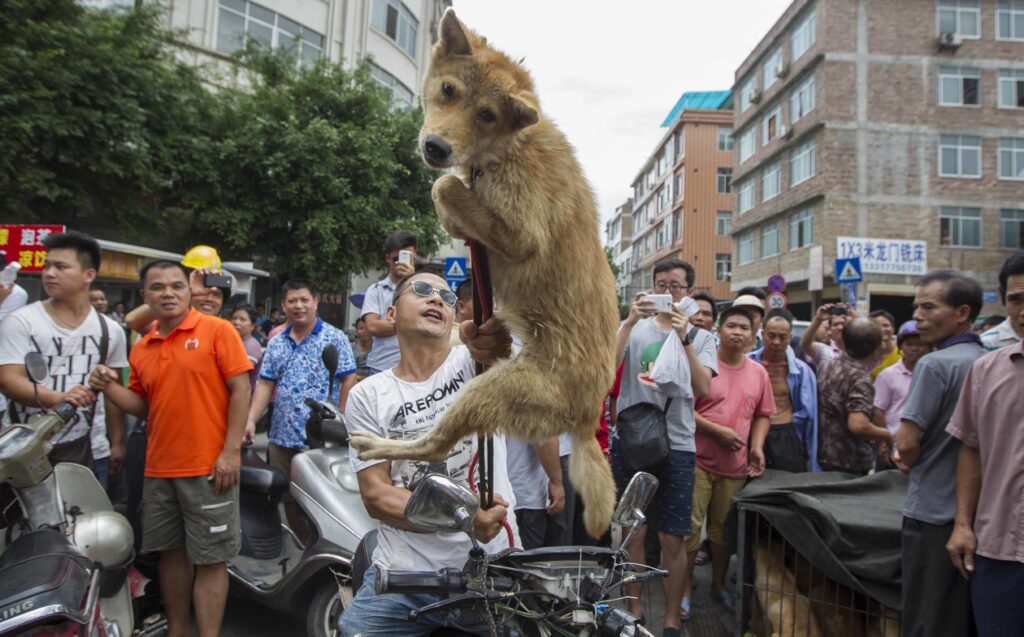
Whether it’s leading a demonstration or intercepting a truck, it’s critical, as Beri says, there is no exchange of money for the dogs in the name of rescue. “Confiscating the inventory is key, fundamentally key,” he says, speaking of dogs both alive and dead, both are money-making inventory. “If you confiscate [the dogs], they lose their money,” he says. Even if human instinct is to offer money, he warns it’s only feeding the industry itself. Staying steadfast sometimes leads to heart-wrenching results. “I can’t tell you how many dogs have died in front of me because they demanded money,” he recalls. “’You don’t give it to me, watch me slaughter this golden retriever, watch me skin it alive,’ as it’s screaming and wagging its tail and begging for help.Having to endure watching that or throwing a puppy and watching it boil or watching the mother fighting to try to keep the puppies alive and watching it get smashed in the head and then the puppies getting smashed. They do that to try to get you to pay.
“I call them subhuman zombies,” he says of the butchers.
How is this a “festival” anyone would want to take part in?
If the savagery isn’t a deterrent, the unclean conditions should be, as Jeff described the “hook, meat cleaver, hang, and blow torch” processing, which he refers to as “killing fields.”
“First of all, when they’re tossed in cages and transported, they’re stuffed into chicken cages, sometimes 10 cages high in 110, 120-degree temperature. Many of them suffocate and they’re all on top of each other,” Beri says. “Think about the bottom row and 10 rows up and all the cages on top of each other, squished inside. That’s the transportation process for the dog meat trucks. When they get to these holding areas prior to being slaughtered, they’re tossed into a room where there’s nothing clean, it’s all feces, dirty water, if there’s any water. Dogs are normally eating feces to try to eat something. The smaller dogs are eaten, so much of the time shredded up by the bigger dogs.
“There’s hardly any food, if ever food, and if there is food, it’s left over from whatever they had with hot peppers and whatever disgusting mulch that is left. The smaller dogs roll themselves in feces, hide in the corner shaking. It’s worse than hell on earth.”
If the Chinese government isn’t going to step in and stop this, then, as Beri points out, it’s up to us — you, me — to take action against it. “The world has no room for this,” he states. “How does China host the Olympics and then have slaughterhouses that are unethical? No country should get away with that. How does any country that is the number two economically powerful country, have no animal welfare laws?
“How does the world accept that?”
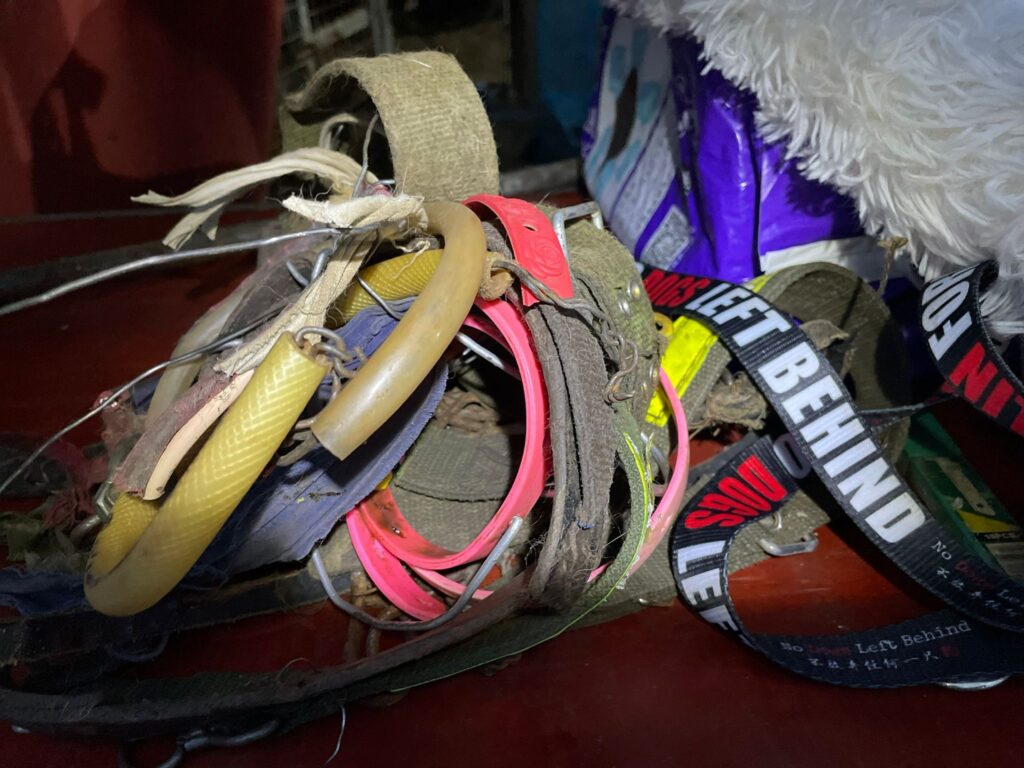
After acquiring the dogs, the NDLB activists make feverish efforts to return them to their original owners, almost entirely to no avail. Though they immediately scan for microchips, most of the dogs don’t have them, so they’re newly microchipped and readied for adoption. The objective is to re-home the dogs before they leave China, with adoption fees ranging from $2,200 – $5,000, costly because of the price of transport, but not including medical attention, and any other costs involved in readying the dogs for their new lives ahead.
NDLB has developed educational initiatives to create waves of awareness throughout Chinese communities. “What we do in China is we allow–for example, prior to COVID–the kids from the Animal Agricultural College of China, they would come on weekends and stay over the weekend and work at our sanctuaries, working with the dogs, and [we’re] teaching them about compassion,” Jeff explains. “We have busloads of kids come in, many of them completely petrified of animals, leaving crying where the parents are calling us up, saying, ‘I can’t believe how you’ve converted my son. He was so scared of dogs and now he can’t take his mind off of Leo’, which was a little pug that they fell in love with.
“On and on I can go, but my going to schools, bringing a dog with me, one of them could be a burn victim. One of them could have lost a limb. The kids seeing them, recognizing what they’ve been through. It’s more or less teaching kids compassion. Then they develop a relationship with the dog and then thekids do cupcake sales to help support some of the dogs’ transports, the kids follow the dogs. Even while the dogs are in America, in their homes, they still follow the dog.”
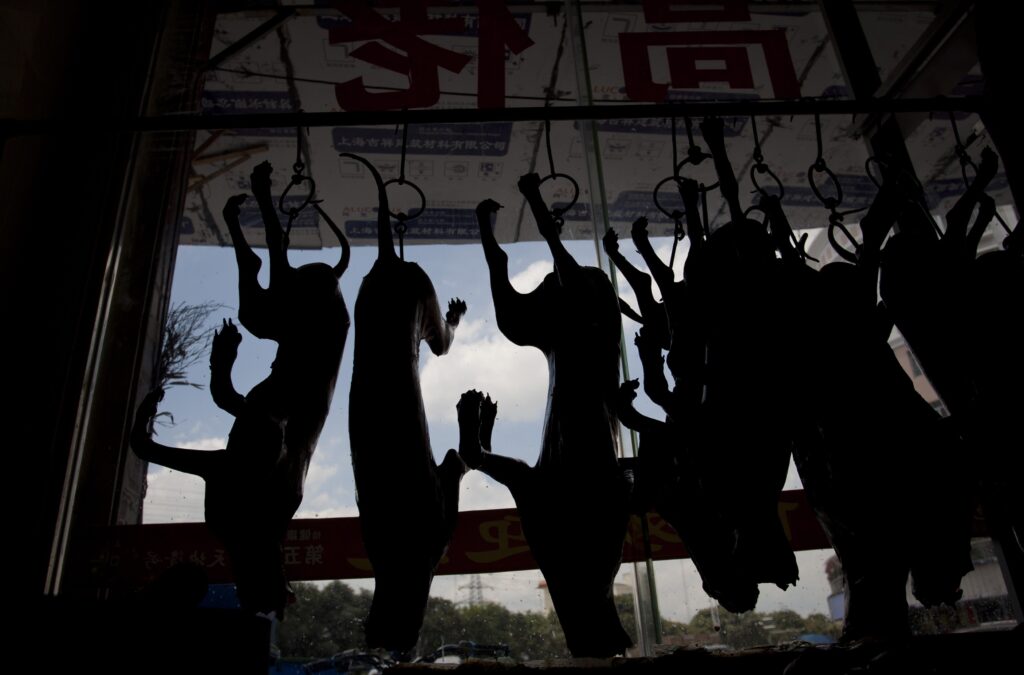
The effects of Jeff’s work, though rewarding, are not without their own aftershock, as witnessed in a recent incident when he was on safe ground and someone walked up to him in a parked car. “One of the people I know came up and pointed to the window and I panicked. I just broke down and realized that, I ambroken fromseeing dogs being butchered and tortured and slaughtered. You put all these things together and there’s only so much one human can take, where they don’t break down. I suffer from extreme anxiety attacks, panic attacks. Your flashbacks just don’t stop.”
Jeff doesn’t detail exactly how the dogs are rescued, only that an extreme amount of planning goes into every operation, with a strong security team and fierce, primarily woman-led armies. If you think you will outsmart No Dogs Left Behind — you won’t. They gather intel and act with military-style precision and strategy. When they are ready, they launch their mission. Once this happens, Jeff estimates their success rateis as high as 99%.
Of the rescue missions, he will say this much: “I can tell you that karma has its own way.”
Jeff’s mom calls and we take a quick break.“She’s the love of life and my rock and my everything, so if she’s calling me, it doesn’t matter what I’m doing, I stop,” he says, of Georgette, a Holocaust survivor, who he counts as his number one supporter. He calls her “one of the most incredible women on the planet.”
His father, who passed away three years ago while Jeff was in China, was also supportive of Jeff leaving his stable existence as a master jeweler behind to put his life on the line for the heart-rendering purpose of saving dogs. “Ferragamo ties, Ferragamo shoes, Ralph Lauren black label suits, 10 black suits, all lined up in the closet,” he recounts, of the world he left behind. “But I wouldn’t trade a thing. There’s nothing like going in and saving lives and then getting them to trust again.”
The ultimate goal of No Dogs Left Behind is positive change. “The number one cause of the deterioration of our planet is animal agriculture, deforestation,” he explains. “Not the water we use, the amount of deforestation, the amount of cow shit, carbon. Climate change irrefutably is the biggest problem we have as a planet. It’s not about race, it’s not about religion, it’s not about sex, it’s not about politics. The fact of the matter is, in 35 years, if we don’t make change now, there is no planet to live on and nobody can dispute that.”
Of his four children, his son, 26-year-old marine biologist Damien Beri, is following in his father’s footsteps on the quest to make a difference. He’s the founder of The Coral Conservancy, a nonprofit devoted to coral restoration throughout Hawaii. “Damian runs a parallel lifestyle to his father. He risks his life in the ocean, I risk my life above ground. The kid’s incredible.” He adds, proudly: “Handsome as all hell.”
“I can’t save ducks, I can’t save chicken, I can’t save pigs, I can’t save cows, I can’t save them all. I could tell you that we don’t need to consume them. I’m not an avid vegan, I’m pretty much a vegan. As I stand, I convert our dogs to plant-based when I save them, they have a plant-based lifestyle. When they start coming to America, we convert and we put half meat, half plant base because if they get here, they’ll be sick from the conversion.
“What is the cause of COVID? Reckless slaughtering of animals, animals for consumption, single-handedly has brought the world to its knees,” Jeff says. “Now, explain to me why the world and governments are not addressing the root cause of the pandemic that brought the world to its knees? Trillions of dollars of deficit, millions of lives and nobody’s addressing the reckless slaughtering of animals. Wet markets, they’re still recklessly slaughtering.”
He thinks that another pandemic, a “superbug,” is on its way.
“There’s already two massive reasons why we should be fighting for change, enforcing global animal welfare laws, but China doesn’t have any animal welfare. Anyone can slaughter anywhere they want. Enforcing animal welfare laws is a huge factor. Animal agriculture is a huge concern. That is the root cause of why I worry about my kids having a planet to live on.”
Up next, Jeff’s putting on his “political hat” for NYC-based policy meetings and plans to expand NDLB to Turkey and Barcelona, where, in the latter, the locals practice the grotesque tradition of an agonizing death for slower, galgos greyhounds,punishing them by smashing their back legs. It’s called a “typewriter death” — their broken legs click against the ground.
“We don’t believe rescue has any borders,” Jeff declares.
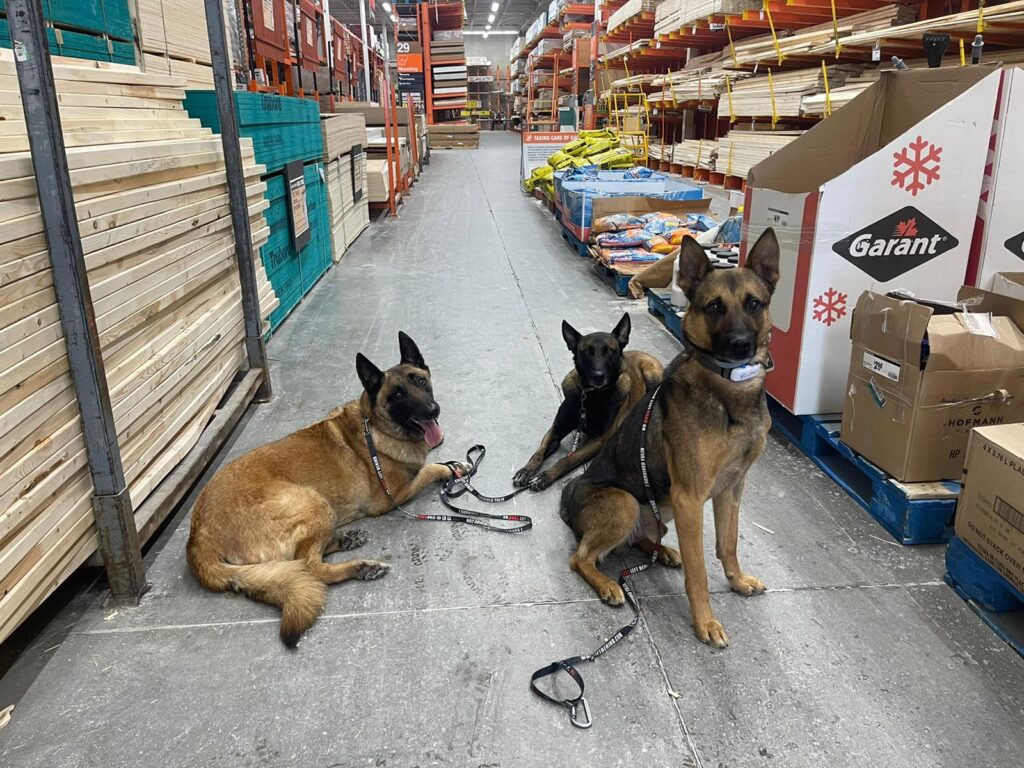
It’s here when I address Jeff’s safety in his own Canadian safe house. After all, his face is all over social media, and the safe house isn’t hard to locate. “Bring it, as far as I’m concerned,” Jeff says, untethered. “If somebody wants to find me, just bring it. You want a piece of me, just come, we’re here. I’m not leaving. I promote it. I promote the sanctuary. I can’t impress upon media to come enough to showcase the sanctuary and tell people about it. This is where they came from,” he says of his survivors. “This is where we rescued them from. This is a free land, man, free country here. I operate out of communist country and the Taliban country. I’m home here.” He estimates NDLB has about hundred active volunteers every day, with two to five on the sanctuary site, cleaning and taking care of the dogs.
And they are always seeking volunteers. If you can’t adopt a dog, consider fostering or volunteering your time. Jeff explains that the CDC has bans on the importation of live animals into America, hence, the Canadian safe house, where he’s repurposed the surrounding woods to build beautiful parks for the dogs, complete with “logs to jump on and jump around.” Cash donations help them to do the great work they do.
Without prompting, he mentions that he’s currently single as, one can imagine, this life makes it hard for him to be a stable partner. “I tell every girl I meet, I’m not worthy of being a good companion. Mentally, I’m not stable, and I couldn’t give you what you want. Honestly, it happens. It happens a lot.” Understandably. Even a simple night out with friends only seems to highlight the disconnect between Jeff’s life and theirs. How could he make airy chit-chat after the horror he’s witnessed—and survived? He works every day, all day, all year; this is not a 9:00 – 5:00 where he ever logs off. His alarm is set for 11:00 at night, as well as 2:30 a.m. to be available in China, sleeping in the safe house on a Murphy bed amongst as many as 45 of the dogs he’s saved, who can come and go within the space as they please. “They are all around me,” he says.
He reaches behind him and grabs a Monster energy drink out of a small fridge. After admitting he doesn’t ever take a day off, he describes the 15-minute breaks he takes to sit with his dogs. “I have a cold beer, just sit outside, just look at the sky. I live a dog’s life. I’m not who I was before, I’ll never be who I was before. I had best friends since childhood, but…we have nothing in common anymore. I can’t go out to a club or a restaurant.” He somberly recalls a scene from six or eight months back, when he went to dinner with a group of people and felt restless and out of place. “I just couldn’t sit at the table anymore. I couldn’t sit with all these people. I was watching people. I’m not fit for society. I have nothing in common with people. Honestly, I’m unfit for society.”
The real truth is, Jeff’s quest for creating a better society detaches him from an everyday, idle one. It’s true he operates at an intense volume, but throughout this intense interview, Jeff and I exchange a friendly Boston versus New York jaunt, we ruminate on the beauty of woodland life, and he sweetly coos at my own elderly dog, who, spontaneously, wakes from a nap and interrupts us with a noble roar.
“This kind of work has to change you, doesn’t it?” I say.
“Yes, yes, yes,” he admits. “Leathered” and “hardened” are words he uses to describe himself, although our conversation reveals a man strengthened by the power of passion and purpose. “I want to know that I’ve made this world just a little bit better,” Jeff declares, of founding No Dogs Left Behind. “I chose dogs.”








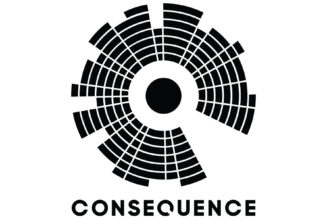
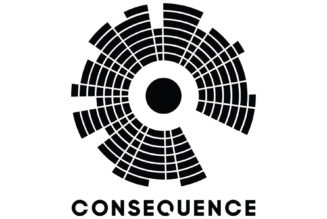
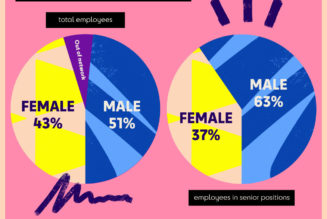
Tagged: FEATURES, Jeffrey Beri, No Dogs Left Behind, Yulin Festival